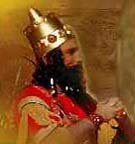 I was very irritated by this article in the NY Times.
I was very irritated by this article in the NY Times.
First of all, I don’t see anything wrong with recreating a significant historical structure for the purpose of promoting culture heritage. I am a financial supporter of Colonial Williamsburg and isn’t that the same type of thing? Just like reenactment is a vibrant way to teach history, I think “living history” exhibits are interesting and educational. Perhaps the author of the article felt compelled to denigrate this effort to revive a people’s pride in their cultural heritage because Saddam Hussein was the proponent of the project.
I also don’t know what was to be gained by labeling Nebuchadnezzar a despot. One of the definitions of despot in the online dictionary is “a person who wields power oppressively; a tyrant.” Is this label applied because he captured Jerusalem and enslaved the Hebrews? That activity was common practice throughout the ancient world so if that is the criteria, you would have to say most of the rulers of the ancient world were despots.
According to the Catholic encyclopedia, “During the last century of Ninive's existence Babylon had been greatly devastated, not only at the hands of Sennacherib and Assurbanipal, but also as a result of her ever renewed rebellions. Nabuchodonor, continuing his father's work of reconstruction, aimed at making his capital one of the world's wonders. Old temples were restored; new edifices of incredible magnificence (Diodor. of Sicily, II, 95; Herodot., I, 183) were erected to the many gods of the Babylonian pantheon; to complete the royal palace begun by Nabopolassar, nothing was spared, neither "cedar-wood, nor bronze, gold, silver, rare and precious stones"; an underground passage and a stone bridge connected the two parts of the city separated by the Euphrates; the city itself was rendered impregnable by the construction of a triple line of walls. Nor was Nabuchodonosor's activity confined to the capital; he is credited with the restoration of the Lake of Sippar, the opening of a port on the Persian Gulf, and the building of the famous Median wall between the Tigris and the Euphrates to protect the country against incursions from the North: in fact, there is scarcely a place around Babylon where his name does not appear and where traces of his activity are not found. These gigantic undertakings required an innumerable host of workmen: from the inscription of the great temple of Marduk (Meissner, "Assyr. Studien", II, in "Mitteil. der Vorderas. Ges.", 1904, III), we may infer that most probably captives brought from various parts of Western Asia made up a large part of the labouring force used in all his public works.
From Nabuchodonosor's inscriptions and from the number of temples erected or restored by this prince we gather that he was a very devout man. What we know of his history shows him to have been of a humane disposition, in striking contrast with the wanton cruelty of most of the iron-souled Assyrian rulers. It was owing to this moderation that Jerusalem was spared repeatedly, and finally destroyed only when its destruction became a political necessity; rebel princes easily obtained pardon, and Sedecias himself, whose ungratefulness to the Babylonian king was particularly odious, would, had he manifested less stubbornness, have been treated with greater indulgence (Jer., xxxviii, 17, 18); Nabuchodonosor showed much consideration to Jeremias, leaving him free to accompany the exiles to Babylon or to remain in Jerusalem, and appointing one of the Prophet's friends, Godolias, to the governorship of Jerusalem; he granted likewise such a share of freedom to the exiled Jews that some rose to a position of prominence at Court and Baruch thought it a duty to exhort his fellow-countrymen to have the welfare of Babylon at heart and to pray for her king.”
This doesn’t sound like a despot to me. It makes me think even more that the purpose of the article was to denigrate the historical culture of Iraq (and therefore its people) – very unworthy of a publication with the general respect of the New York Times.
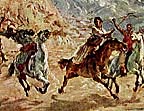 "'Don't give your son money,' Winston Churchill once advised parents. 'As far as you can afford it, give him horses. No one ever came to grief -- except honourable grief -- through riding horses. No hour of life is lost that is spent in the saddle. Young men have often been ruined through owning horses, or through backing horses, but never through riding them; unless of course they break their necks, which, taken at a gallop, is a very good death to die.'"
"'Don't give your son money,' Winston Churchill once advised parents. 'As far as you can afford it, give him horses. No one ever came to grief -- except honourable grief -- through riding horses. No hour of life is lost that is spent in the saddle. Young men have often been ruined through owning horses, or through backing horses, but never through riding them; unless of course they break their necks, which, taken at a gallop, is a very good death to die.'"
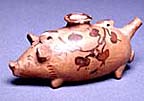 "The study of childhood in ancient Greece can illuminate both what is universal and what is specific about child rearing, what effects this might have had on Greek civilization,” writes Jenifer Neils, the Ruth Coulter Heede Professor of Art History at Case Western Reserve University. Neils is cocurator of a new exhibition, Coming of Age in Ancient Greece: Images of Childhood from the Classical Past, with John Oakley, chair of classical studies at the College of William and Mary.
"The study of childhood in ancient Greece can illuminate both what is universal and what is specific about child rearing, what effects this might have had on Greek civilization,” writes Jenifer Neils, the Ruth Coulter Heede Professor of Art History at Case Western Reserve University. Neils is cocurator of a new exhibition, Coming of Age in Ancient Greece: Images of Childhood from the Classical Past, with John Oakley, chair of classical studies at the College of William and Mary.
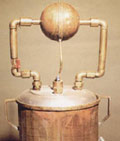 "Long before Galileo changed the course of history in the 1600s with his astronomical discoveries, ancient Greeks were calculating the circumference of the earth, gauging lunar eclipses, pumping water, making steam engines and even building toy automatons for lack of another purpose in pre-industrial antiquity.
"Long before Galileo changed the course of history in the 1600s with his astronomical discoveries, ancient Greeks were calculating the circumference of the earth, gauging lunar eclipses, pumping water, making steam engines and even building toy automatons for lack of another purpose in pre-industrial antiquity.
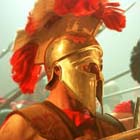 Explore "the birth of the unique Spartan social system. Militaristic, communal and disciplined, the state enforces eugenics and euthanasia. Priests decide which babies should live and which should be left to die. Seven-year-old boys are forced to fend for themselves on the harsh mountainside. Policed by secret spies, the society is supported by a nation of slaves. "
Explore "the birth of the unique Spartan social system. Militaristic, communal and disciplined, the state enforces eugenics and euthanasia. Priests decide which babies should live and which should be left to die. Seven-year-old boys are forced to fend for themselves on the harsh mountainside. Policed by secret spies, the society is supported by a nation of slaves. "
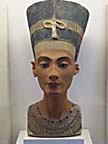 One of the members of our Imperial Rome discussion group mentioned the possibility that Akenaten turned to the Aten after Nefertiti died when she was not healed by his prayers to Amun. I don't think Akenaten blamed Amen-Ra for Nefertiti's death as she didn't die until well into the Amarna experiment when a plague swept through Egypt. Several of their daughters died at that time as well. (This was apparently concluded by scholars because records of the plague are known and Nefertiti disappears from the historical record at the same time.)
One of the members of our Imperial Rome discussion group mentioned the possibility that Akenaten turned to the Aten after Nefertiti died when she was not healed by his prayers to Amun. I don't think Akenaten blamed Amen-Ra for Nefertiti's death as she didn't die until well into the Amarna experiment when a plague swept through Egypt. Several of their daughters died at that time as well. (This was apparently concluded by scholars because records of the plague are known and Nefertiti disappears from the historical record at the same time.)